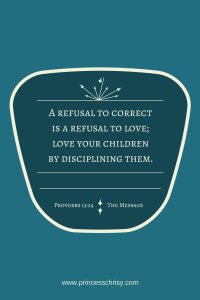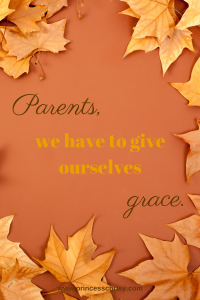
Discipline. Such a tricky topic.
Proverbs 13:24 (NIV) says:
Whoever spares the rod hates their children,
but the one who loves their children is careful to discipline them.
Many people tend to get hung up on the “spare the rod” part of this verse. Some because they believe spanking is a necessary part of discipline, and some because they do not think spanking is a good idea. The Message says it this way:
A refusal to correct is a refusal to love;
love your children by disciplining them.
Rather than thinking in terms of corporal punishment, it is better to think in terms of correction and discipline, and what our stance on correction and discipline says about us to our children.
From a very young age, it has been important to my husband and I to make sure that we handled discipline for our children well. Discipline is necessary if we are going to teach our children responsibility. Discipline is necessary to show children that there are consequences for their actions. We are living in a world where no one wants to take responsibility for their actions and live with their consequences. I think that this is tied directly to the fact that as children, many weren’t taught to be responsible for their actions and understand the concept of consequences.
In addition, children will never learn obedience to God if they have never learned obedience to their parents.
One of the key pieces in discipline for me has been getting my children to understand what they did wrong, why it was wrong, and why discipline and consequences are necessary. Or in a shorter way, getting to the heart of my children.
The interesting thing is that all children are different and it takes different methods to get to their heart. One of my children is very repentant and it doesn’t take much to get confession and repentance. The other one takes a bit longer to get there. (I’ll leave it up to you to decide which is which.)
There have been some constants in the way our family approaches discipline:
- The bathroom is the “neutral” zone of the house and where we meet to talk. This way the location isn’t a bedroom or common family area, and we can go back to regular life in the rest of the house.
- If spanking was warranted, we used a wooden spoon, rather than our hands, and explained that the spoon was a tool we were using for discipline, rather than our own self. We had a 3-swat maximum. And that was only for the worst offense, which in our house is lying.
- Before spanking or handing out consequences, there is always a discussion time where the child has to tell us what they did wrong, why it was wrong, and ask for forgiveness. Then the parent talks with them about the offense, explains why discipline is necessary from a Biblical standpoint and a relational standpoint (both between us and the child and God and the child).
- Then the swat(s) or consequences come.
- After that is a (long) time of loving on the child, voicing forgiveness, telling that from that point on that they are forgiven and we were moving forward.
- Then we leave the bathroom and are done with it, hopefully with some heart change on the part of the child so that we didn’t have to come back to the bathroom for the same issue.
(Note: Now that our children are 11 and nearly 14, spanking is not the discipline of choice, and even before that, spanking was used rarely; likely because discipline was happening all day every day as we taught them right and wrong, so we often didn’t get to that point.)
But not every child or every offense is so cut-and-dry. That’s where you have to get creative. That’s where you have to understand your child and what makes them tick. That is where you have to call out to God for guidance because frankly, sometimes, you have NO FREAKING CLUE how to get to the heart of your child.
Some children respond well to grounding. Some don’t. Some children need a challenge to work for rather than consequences to avoid. Some children need to talk it out. Some children don’t. Some children respond well to discussion and are immediately repentant. Some children get angry and need some time to cool off and think before they are able to be repentant.
The only constant about discipline is that it is necessary. We must provide discipline and correction for our children. It is required.
But everything else about how you do it has to be somewhat flexible based on the child, the offense, and the parent.
If you know you have a tendency to get out of control angry at your child, spanking is probably not a good form of discipline for you to use.
If you know that you have a tendency to talk things to death and your child zones out about 10 seconds into your talk, then perhaps you need to adjust the way you discipline them.
If you keep having to discipline your child for the same offense over and over and you aren’t getting anywhere, then the consequences probably need to change, as well as the way you are handling the discipline.
Like I said at the beginning, this is a tough subject. But it is a necessary one. Because we are molding our children’s hearts, not just their behavior. And heart change is lasting change.
Resources that have helped me in the area of discipline:



